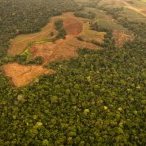English · Español

28 March 2017 | Interviews | Resisting neoliberalism | Forests and biodiversity | Food Sovereignty
Satellite images confirm out-of-control expansion of pine monoculture plantations in Costa Rica and the loss of thousands of hectares of forests
Download: MP3 (5.5 Mb)
Costa Rican social and environmental organizations have been denouncing for years the expansion of pine monoculture plantations in the country, which has reduced the area destined to basic food crops and has caused the pollution of water sources and the elimination of thousands of hectares of tropical forests. But their claims were confirmed early March, when they accessed a government-approved document that concludes that the Agricultural Census of 2015 did not record 35% of pine plantations and that five thousand hectares of forests were illegally cut down between 2000 and 2015.
This confirmation emerged from the Monitoring of Land Use Change within Production Landscapes (MOCUPP), promoted by the Environment and Energy and the Agriculture and Livestock Ministries of Costa Rica, with the coordination of the United Nations Development Program (UNDP).
Real World Radio interviewed Mauricio Álvarez, chair of the Costa Rican Conservation Federation (FECON) about the importance of this document and the doors opened by it.
Álvarez said that up until now, organizations did not have data about the expansion of pine crops, although they had the experience of many communities, who saw how entire forests disappeared overnight. In addition, the crop has extended over areas that before were focused on rice, beans and maize crops, “which are the basis of the food sovereignty of the country, and suddenly we saw them turned into green pine deserts”, regretted Álvarez. “We always said that this expansion was out of control, but they told us it was planned. Nobody really knew how many pine crops there were, their location and what we had to stop producing”, he added.
Álvarez also added that Costa Rica is a small country: “we have approximately 500,000 hectares for agriculture, and over half of them are monoculture plantations, mainly coffee, sugarcane, pine, banana and African palm; these last three are the most concerning for us because they are monocultures for export, together with sugarcane which is being used to produce ethanol. All basic grains are lost, they are being imported from other countries and these lands are lost forever for export-oriented monoculture plantations, displacing small farmers”.
The Agricultural Census of 2015 had recorded 37,659 hectares of pine plantations, but satellite images detected 58,442 hectares, i.e., 20,000 more than those declared. According to Álvarez, there hasn´t been an official response to the report. “The Agriculture Ministry stated that they will give the report to pine producers so that they can defend themselves, and they haven´t made reference to the report in detail”. The differences responded to an “excessive trust in the businessmen who provided the information”, said Álvarez, who added that “they did not let the census officers enter their lands and gave them their own information about the number of hectares planted”. One of the tactics used to mislead the officers was to leave a line of trees around plantations, to hide pine monocrops.
“We need to find those responsible. Now we could say to consumers in Europe: “This company deforested 100, 200, 300 hectares of forests inhabited by wild felines and all types of mammals, and the pineapple you bought for 1 euro, cost thousands and thousands of dollars here”, said Álvarez, and he added that would have to add the cost of deforestation, the loss of carbon neutrality and the pollution caused by the plantation, because nearby communities have found up to 22 different chemicals in their water sources.
Organizations such as Fecon are looking into filing legal complaints; Álvarez said that “the people convicted for environmental crimes can be counted with one hand”. “We will look for the most emblematic cases to bring them to justice and set a precedent, because we understand that environmental impunity is strengthened and based on the absence of exemplifying cases. This has motivated everyone to commit environmental crimes since it is very difficult to bring them to trial, let alone imprison them”.
In addition to the consequences of this document within Costa Rica, Álvarez encouraged other countries to use this low-cost tool to observe the large extensions of monoculture plantations expanding around the world.
Imagen: http://www.feconcr.org







